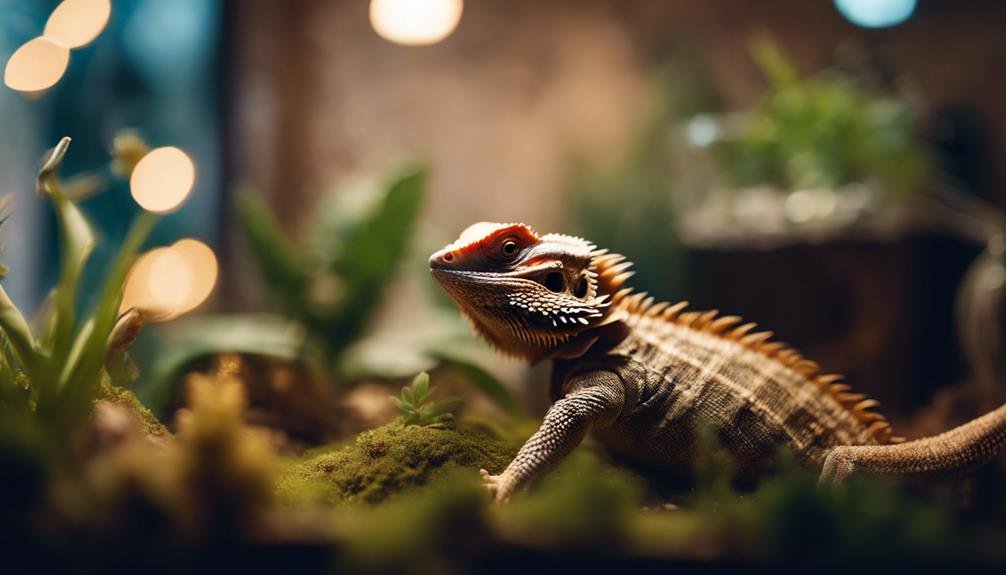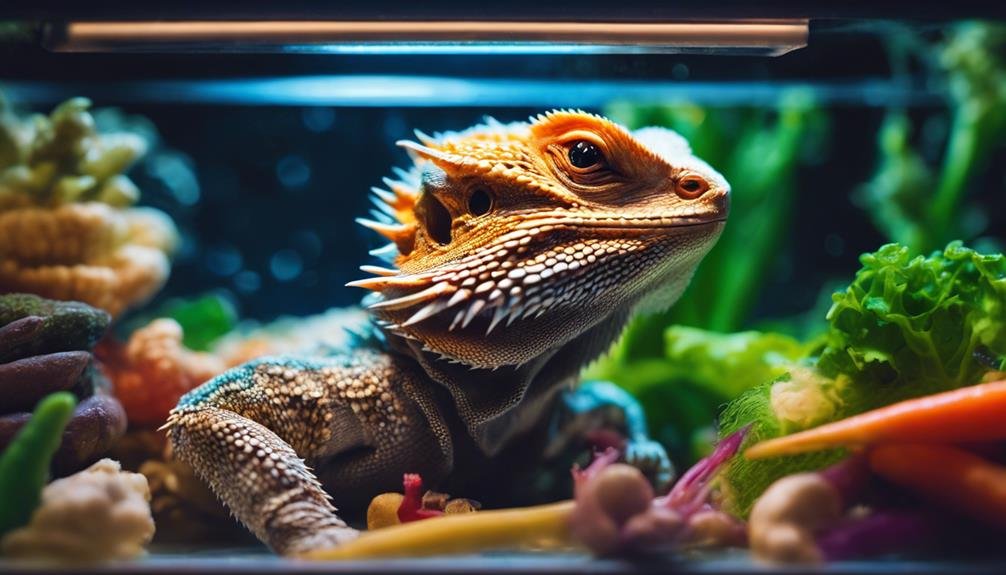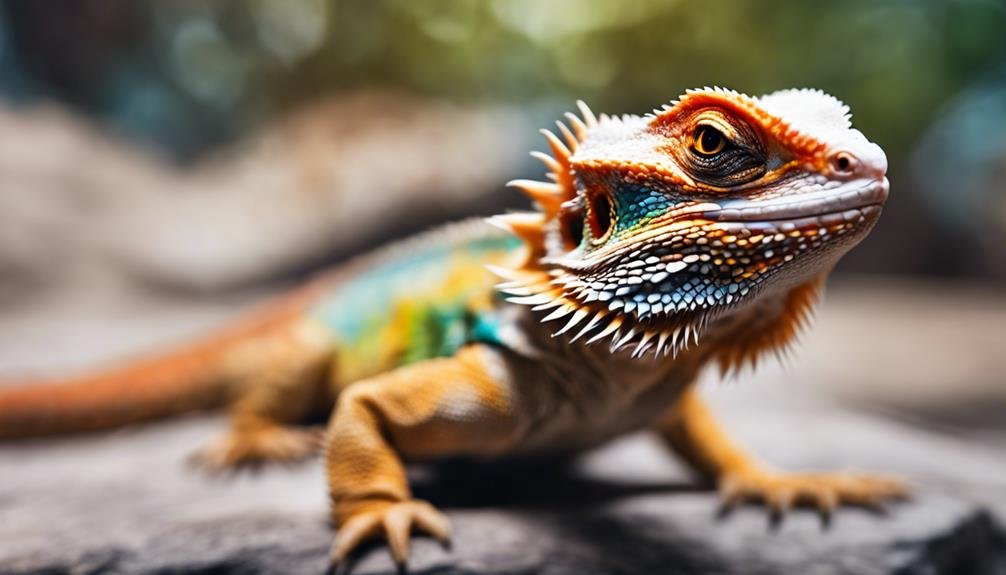As a bearded dragon owner, it’s important you’re mindful of the subtle signs that could indicate your pet is in distress. Ignoring symptoms such as lethargy, appetite loss, or unusual behaviors can lead to serious health issues, potentially resulting in premature death. You’ve got to grasp the significance of a proper habitat, balanced nutrition, and the need for prompt veterinary care. But how can you spot these signs early enough, and what preventive measures can you take to make sure your bearded dragon lives a long, healthy life? There’s much to contemplate if you want to keep your scaly friend thriving.
Key Takeaways
- Watch for lethargy and loss of appetite as early signs of potential health issues that can lead to death if untreated.
- Ensure a diet rich in calcium and vitamins to prevent Metabolic Bone Disease, a common cause of death.
- Maintain proper UVB lighting and temperature in the habitat to support healthy digestion and prevent respiratory infections.
- Regularly clean the habitat and monitor for signs of parasites or mouth rot, which can be fatal if ignored.
- Seek prompt veterinary care for any signs of distress or illness to diagnose and treat conditions before they become fatal.
Recognizing Critical Symptoms
Several signs can alert you that your bearded dragon might be nearing death, requiring your immediate attention. As a pet owner, it’s important to recognize these symptoms early to possibly prevent a tragic outcome. Bearded dragons, like any pet, can suffer from a variety of health issues that, if left untreated, may lead to critical conditions or even death.
One such condition is metabolic bone disease, which is often caused by a lack of calcium in their diet or insufficient UVB lighting, hindering their ability to produce Vitamin D and properly absorb calcium. This can lead to lethargy and a noticeable loss of appetite in your bearded dragon. Another concerning symptom is mouth rot, a condition that can indicate serious health issues requiring immediate care.
Understanding these signs and making sure that your bearded dragon has the proper diet and environment, including adequate UVB lighting, can help prevent these critical conditions. By being vigilant and proactive in the care of your pet, you can reduce the risk of these severe health issues and ensure a healthier life for your bearded dragon.
Common Health Issues
Understanding the critical symptoms can help, but it’s also essential to be aware of the common health issues bearded dragons face, including metabolic bone disease and respiratory infections. Metabolic Bone Disease (MBD), or nutritional secondary hyperparathyroidism, frequently plagues these reptiles due to an improper diet lacking in calcium or inadequate UVB lighting, which is essential for calcium metabolism. Without proper care, MBD can lead to weakened bones and deformities.
Respiratory infections are another prevalent concern, with symptoms like sneezing and rapid breathing signaling trouble. These infections can be exacerbated by improper humidity levels, but this aspect touches on habitat setup, which isn’t our focus here.
Infectious stomatitis, known as mouth rot, presents a significant risk. It’s a condition where harmful bacteria infect the gums and jawbone, often due to poor hygiene or injury. Bearded dragons can also suffer from parasites, including pinworms, motile protozoa, and coccidia, which compromise their health.
Lastly, adenovirus infections are notable, causing severe hepatitis and gastrointestinal issues that manifest as weakness and lack of appetite. Recognizing these common health issues early can be pivotal in ensuring the well-being of your bearded dragon.
Proper Habitat Setup


Creating an ideal habitat for your bearded dragon is essential for its overall health and well-being. To start, make sure the terrarium has proper UVB lighting, as it’s vital for their health. Without it, your bearded dragon could face serious health issues, including metabolic bone disease. Remember to replace UVB bulbs every six months to guarantee your pet gets the UV exposure it needs.
Temperatures within the terrarium must be carefully monitored and maintained. Provide a basking spot with temperatures between 95-110 degrees Fahrenheit. This mimics their natural environment and helps them regulate their body temperature. However, don’t overlook the importance of a proper nighttime temperature range of 65-75 degrees Fahrenheit to ensure your bearded dragon’s comfort after the sun goes down.
Maintaining these temperatures prevents a myriad of health issues and supports proper diet digestion, although the specifics of the diet will be addressed separately. By setting up the terrarium with the right UVB lighting and temperature gradients, you’re laying a foundation for a healthy, happy bearded dragon.
Nutrition and Diet
In order for your bearded dragon to thrive, it’s important to provide a diet rich in leafy greens, vegetables, fruits, and insects. This balanced approach to nutrition is key in preventing health issues, such as metabolic bone disease (MBD), which is a common ailment in bearded dragons due to calcium deficiency. Incorporating calcium and vitamin supplements into their diet can greatly reduce the risk of MBD and other nutritional deficiencies.
Feeding your bearded dragon live insects like crickets, roaches, and mealworms not only satisfies their natural hunting instincts but also provides essential protein and nutrients necessary for their growth and well-being. However, it’s important to avoid overfeeding fatty or sugary foods, as this can lead to obesity and related health issues.
A variety in your bearded dragon’s diet ensures a balanced nutritional intake, strengthening their overall health. Remember, the right diet and nutrition are fundamental in avoiding signs of distress and disease in your bearded dragon. Consistently providing a diet rich in necessary supplements, insects, and a variety of fresh produce will support their vitality and help prevent the onset of metabolic bone disease and other nutrition-related issues.
Preventative Care Measures


In order to keep your bearded dragon healthy, it’s important to implement several preventative care measures. Proper lighting, heating, and humidity levels are foundational to prevent health issues, particularly metabolic bone disease, which is common in bearded dragons lacking UVB light exposure. Providing a balanced diet rich in calcium and vitamins supports their overall well-being, reducing the risk of nutritional deficiencies.
Regular cleaning and disinfecting of your bearded dragon’s habitat are essential to maintaining a healthy environment, free from harmful bacteria and parasites. It’s also essential to monitor your pet for any signs of illness or distress. Early intervention can make a significant difference, allowing you to address minor issues before they escalate into severe problems.
Don’t hesitate to seek veterinary care at the first sign of health issues. A vet specialized in reptile care can offer invaluable advice and treatment, helping to avoid serious complications. Remember, preventive measures aren’t just about avoiding negative outcomes; they’re about ensuring your bearded dragon leads a long, happy, and healthy life.
What Are Some Signs of Stress in Bearded Dragons, and How Can They Be Avoided?
Some signs of stress in bearded dragons when introducing bearded dragons together include puffing up their beard, hiding, and loss of appetite. To avoid stress, create separate tank areas, provide hiding spots, and monitor their interactions closely. Gradually introducing them to each other can also help reduce stress.
Frequently Asked Questions
What Is the Most Common Cause of Death in Bearded Dragons?
The most important cause of death in bearded dragons is respiratory infections, often due to improper lighting, inadequate temperatures, or dehydration risks in their enclosure.
Nutritional deficiency, particularly from a lack of calcium, can lead to metabolic bone disease, another significant threat.
Internal parasites, environmental stressors, and exposure to incorrect conditions can also cause serious health issues.
It’s essential you monitor their environment closely to prevent these common causes of death.
How Do I Know if My Bearded Dragon Is Brumating or Dying?
To determine if your bearded dragon is brumating or dying, look for brumation signs like lethargy, appetite changes, and seeking hiding spots, which are normal. Assess its activity; a significant drop might be concerning.
Temperature plays an important role, so make sure their enclosure is properly heated.
Watch their behavior closely, monitor their enclosure, check their hydration, and consider their age.
These steps can help you distinguish between natural brumation and potential health issues.
How Can I Prevent My Bearded Dragon From Getting Disease?
To prevent your bearded dragon from getting diseases, make sure they’ve got proper lighting and a balanced diet. Regularly clean their home and keep them well-hydrated.
Temperature control is vital, as is reducing stress in their environment. Don’t forget about parasite prevention and the importance of routine vet checkups.
These steps not only keep them healthy but also sidestep common issues that could lead to serious problems down the line.
What Helps a Bearded Dragon Survive?
To help your bearded dragon thrive, you need to focus on a few key aspects.
First, make sure they’ve got proper lighting and a balanced diet, which are essential.
Temperature control can’t be overlooked, and neither can regular vet visits.
Keeping their habitat clean reduces stress and potential illnesses.
Don’t forget about hydration importance and introducing enrichment activities to keep them engaged.
Together, these steps greatly improve their chances of a healthy, long life.
Conclusion
To sum up, you’ve got the power to spot critical symptoms and tackle common health issues in your bearded dragon. By ensuring their habitat is set up correctly, offering a diet rich in calcium and nutrients, and sticking to preventative care measures, you can help prevent premature death.
Don’t overlook regular vet visits and stay vigilant for signs of distress. Your proactive steps are key to ensuring your scaly friend enjoys a long, healthy life by your side.


